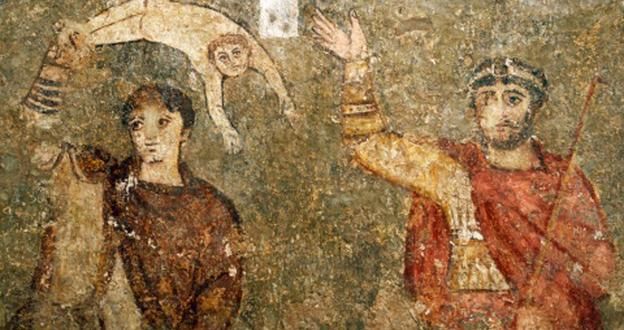Israelís controversial King Herod exhibition

Early Christian fresco of King Herod's slaughter of the Innocents in the hypogeum of Santa Maria in Stelle, Italy. (De Agostini/Getty Images)
18 January 2013
By Husna Haq
A forthcoming exhibition in a Jerusalem museum proves even archaeology is a flashpoint in Israel and the Palestinian territories.
On Tuesday, Israel’s national museum announced the opening of the world’s first exhibition devoted to the archaeological legacy of King Herod, the biblical Roman-Jewish king who ruled Jerusalem from 37 to 4 BC. Israel Museum will debut the Herod the Great exhibition on 13 February despite protests from Palestinians who object to the excavation and display of artefacts found in the West Bank without permission of Palestinian authorities. The anticipated exhibition, which will run until October, will include what is believed to be Herod’s tomb and sarcophagus. This represents the museum’s largest and most expensive archaeological project to date.
In the New Testament, Herod, also known as King of Judea, is portrayed as a tyrant who butchered Bethlehem’s male children in an attempt to prevent the prophesized birth of Jesus. He was known as a ruthless ruler who murdered his own wives and members of his family, as well as a visionary respected for his ambitious building projects. Among his architectural achievements were lavish desert palaces, fortresses and temples, as well as the expansion of the Second Temple in Jerusalem, his most famous project.
Historians believe Herod constructed an extravagant, 25m-long tomb for himself before his death. It was this archaeological treasure that Israeli archaeologist Ehud Netzer spent his career searching for. In 2007, Netzer announced to the world that he had found what he believed was Herod’s tomb – a landmark moment in archaeology. The tomb was found at Herodium, the ruler’s winter palace in the Judean Desert near Bethlehem in the West Bank. As the Israel Museum was planning an exhibition featuring the prized find, however, Netzer fell to his death while surveying the site.
http://www.bbc.com/travel/blog/20130117-israels-controversial-king-herod-exhibition
